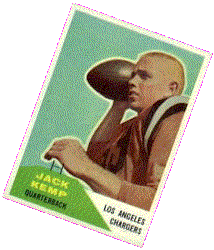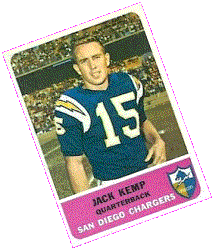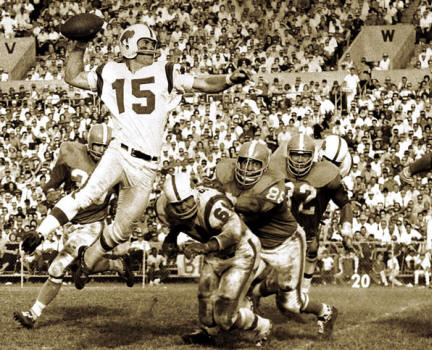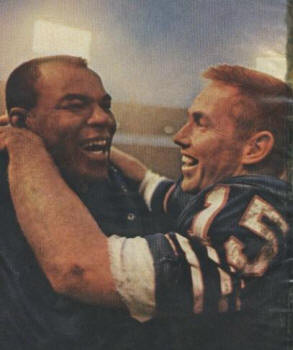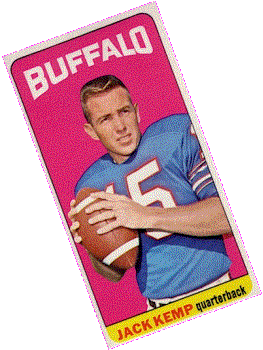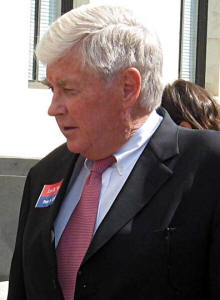The 1965 Bills, according to Lamonica, had a new emphasis, and altough they had depended a lot on Gilchrist and the running attack to carry them in 1964, that all changed in 1965. The Bills had traded Gilchrist to the Broncos in the off-season, so in 1965, they went to a pass-oriented game more than they ever had before. They not only went to the receivers, but often threw to the running backs. Lamonica feels that change brought out the best in Kemp that year. In 1965, the Bills finished with a 10–3–1 record. Kemp was second in the league in pass completions. Because of their overwhelming talent, and Gilchrist's absence from the Bills' backfield, San Diego was favored in the AFL Championship Game. However, Buffalo once more defeated the Chargers, this time 23-0. Kemp again won the title against his former team. His role in leading the Bills to a repeat championship without Gilchrist and with star receiver Elbert Dubenion playing in only three games earned Kemp the Associated Press AFL MVP award. He also won the AFL Championship Game MVP award.
|
|
|||||
|
|
|
|
|
||
| . | |||||
| . |
|
|
|
Jack Kemp was born July 13, 1936 in Los Angeles, the third of four sons.
Sports were always important to him and once, when he had to write a
high school essay on significant inventions, he chose "the forward pass"
as his topic. |
|
Kemp had a "cup of coffee" with four NFL teams:
the Lions, who drafted and then cut him in 1957, and then with the
Steelers, 49ers and Giants. He played one game with the
CFL's Calgary Stampeders in 1959. Five teams failed to
recognize his determination and potential. |
|
On September
25, 1962,
Buffalo Bills' head
coach
Lou Saban saw that Kemp was available
and claimed him for a $100 waiver fee in one of
the biggest bargains in Professional
Football history. The
Dallas Texans
and
Denver Broncos
had also attempted to
claim Kemp, but AFL commissioner
Joe Foss
awarded his rights to
the Bills.
Kemp at first was disappointed at going to
Buffalo. As an avid skier, he had hoped to go
to Denver. But he soon learned of the excellent
skiing just a half-hour from Buffalo in Western
New York's Southern Tier, and he and his
wife Joanne, a former college sweetheart, became
regulars there. |
|
In 1963, Kemp led the Bills from a slow start to a 7–6–1 record and a tie for the lead in the AFL Eastern Division. For the third time in four seasons, Kemp again placed second in passing attempts, completions, and yards. He also finished second in the league in rushing touchdowns, to teammate Cookie Gilchrist. The Bills played the Boston Patriots in a playoff game to determine the Eastern Division title on December 28, 1963, at Buffalo's War Memorial Stadium in 10 °F weather. During the game, after falling behind 16–0, Saban replaced Kemp with Daryle Lamonica but the Bills still lost 26–8. Lamonica and Kemp formed a one-two punch for the next two years, and were the basis of a hot "quarterback controversy" among Bills fans. |
|
|
|
|
Kemp led Buffalo to four straight appearances in the AFL playoffs, three consecutive Eastern Division titles, and two straight AFL Championships. He led the league all-time in career passes attempted, completions, and yards gained passing. He started in five of the AFL's ten Championship Games, and holds the same career records (passing attempts, completions, and yardage) for Championship Games. He is second in many other championship game categories, including career and single-game passer rating. He was The Sporting News' American Football League All-League selection at quarterback in 1960 and 1965, and the AFL MVP in 1965. He was the only AFL quarterback to be listed as a starter in five AFL championship games, and in all 10 years of the league's existence; and one of only 20 players to serve on an AFL team all 10 of those years. Kemp held the Professional Football record for career touchdowns scored by a quarterback (forty) for thirty years, until it was broken in 1999, and he still ranks second in the category. With such credentials, the only reason he is not in the Pro Football Hall of Fame seems to be that he starred in the wrong league. He is, however, in my American Football League Hall of Fame. |
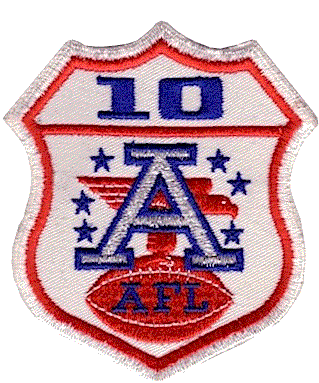
|
In
1969, knowing that it was the last season of the American Football
League, I made three plaques featuring the AFL logo, to present to the
three Buffalo Bills who had been in the league for its entire ten years:
Paul Maguire,
Harry Jacobs, and Kemp. In those days, players were not
inaccessible, and I brought one plaque to Kemp's home. When I told
him my name, he clearly knew that I was the fan who for years had
bedeviled him with letters to the editor, demanding that Lamonica
replace him. With a wry smile, he said "I always thought you
had horns!" but he graciously accepted the plaque. |
|
|
Jack
and Joanne had four children, two boys and two girls. He never
missed a football game played by either son, and saw both play
Professional Football. After his own football career, Kemp went on
to ably serve Western New York for nine terms as a U.S. Congressman.
He exemplified the phrase "bleeding heart conservative", and
showed that a man could be a champion of Republican ideals, but still
care for and protect the common man. He later served in the
Cabinet as Secretary of Housing, and eventually ran for Vice President
on a ticket with Robert Dole. |
|
||
|
| PATRIOTS | Bills | Oilers | JETS | Broncos | CHIEFS |
|
Raiders | ||||||||
| Page | Cards | Page | Cards | Page | Cards | Page | Cards | Page | Cards | Page | Cards | Page | Cards | Page | Cards |
| Click here for an all-time roster of American Football League players. | |||||||||||||||
